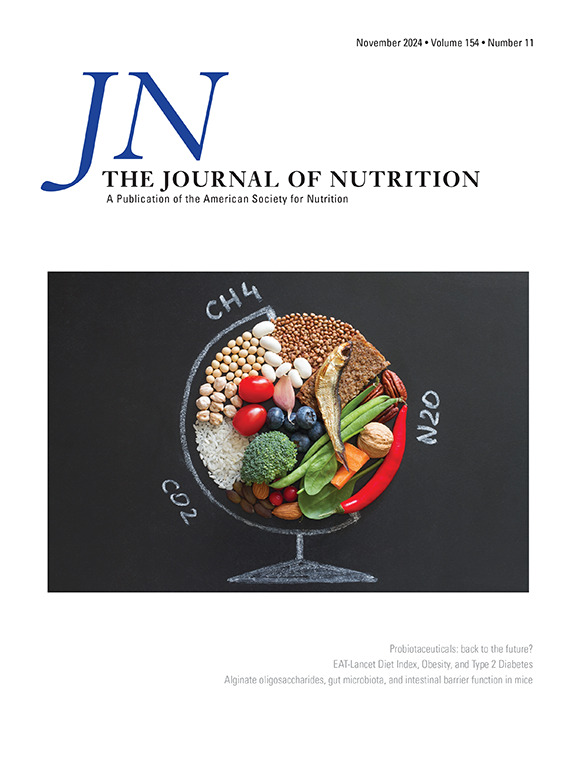Maternal Plasma Choline Levels Are Positively Correlated with Maternal and Placental Phospholipid-DHA Content in Females with Obesity Who Receive DHA Supplementation
IF 3.7
3区 医学
Q2 NUTRITION & DIETETICS
引用次数: 0
Abstract
Background
Pregnancies complicated by maternal obesity are characterized by metabolic differences affecting placental nutrient transport and fetal development. Docosahexaenoic acid (DHA) is critical for fetal brain development and is primarily incorporated into phosphatidylcholine (PC). Recent evidence suggests that choline may enhance PC-DHA synthesis; however, data on the impact of maternal plasma choline on placental phospholipid DHA content in females with obesity are limited.
Methods
We conducted a secondary analysis of a DHA supplementation trial (800 mg/d) in 38 pregnant females with obesity (body mass index ≥30 kg/m2). Blood samples at 36 wk gestation and term placentas were analyzed for phospholipids using mass spectrometry. Choline transporter-like (CTL) proteins in the syncytiotrophoblast microvillous (MVM) and basal plasma membranes were quantified by Western blot.
Results
Daily DHA supplementation from 25 wk gestation was associated with higher maternal plasma and placental PC- and lysophosphatidylcholine (LPC)-DHA. A significant interaction (P interaction <0.05) between DHA supplementation and choline indicated that higher choline enhanced the incorporation of DHA into plasma PC. MVM CTL-1 expression was correlated with placental total PC-DHA and LPC-DHA content, suggesting that CTL-1 has a predominate role in placental choline uptake and phospholipid synthesis.
Conclusions
These findings suggest that choline may influence maternal PC- and LPC-DHA synthesis and plasma levels, as well as the expression of placental choline transporters and the resulting PC- and LPC-DHA content in females with obesity. These relationships may have implications for DHA transport to the fetus and overall fetal development.
在接受DHA补充的肥胖女性中,母体血浆胆碱水平与母体和胎盘磷脂-DHA含量呈正相关。
妊娠合并产妇肥胖的特点是代谢差异影响胎盘营养转运和胎儿发育。二十二碳六烯酸(DHA)对胎儿大脑发育至关重要,主要被纳入磷脂酰胆碱(PC)。最近的证据表明胆碱可以促进PC-DHA的合成;然而,关于母体血浆胆碱对肥胖女性胎盘磷脂DHA含量影响的数据有限。我们对38名肥胖孕妇(体重指数≥30 kg/m2)进行了DHA补充试验(800 mg/d)的二次分析。使用质谱法分析妊娠36周的血液样本和足月胎盘的磷脂。Western Blot法定量测定了合胞滋养细胞微绒毛(MVM)和基膜(BM)中胆碱转运蛋白样(CLT)蛋白的表达。从妊娠25周开始,每日补充DHA与母体血浆和胎盘PC-和溶血磷脂酰胆碱(LPC)-DHA升高有关。显著相互作用(P相互作用)
本文章由计算机程序翻译,如有差异,请以英文原文为准。
求助全文
约1分钟内获得全文
求助全文
来源期刊

Journal of Nutrition
医学-营养学
CiteScore
7.60
自引率
4.80%
发文量
260
审稿时长
39 days
期刊介绍:
The Journal of Nutrition (JN/J Nutr) publishes peer-reviewed original research papers covering all aspects of experimental nutrition in humans and other animal species; special articles such as reviews and biographies of prominent nutrition scientists; and issues, opinions, and commentaries on controversial issues in nutrition. Supplements are frequently published to provide extended discussion of topics of special interest.
 求助内容:
求助内容: 应助结果提醒方式:
应助结果提醒方式:


